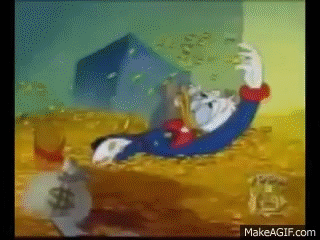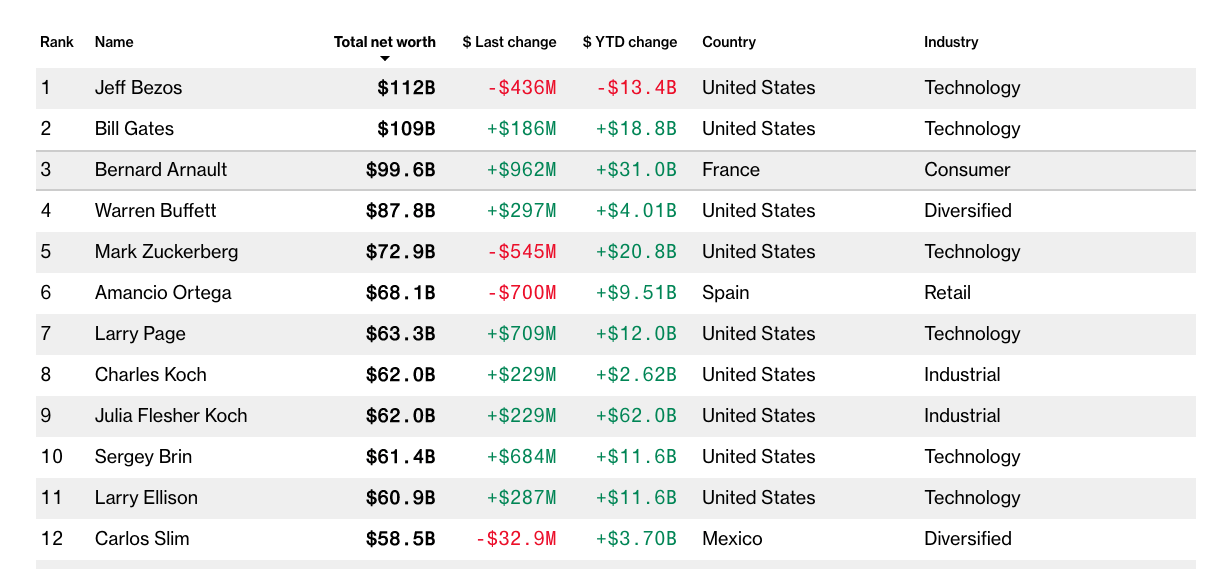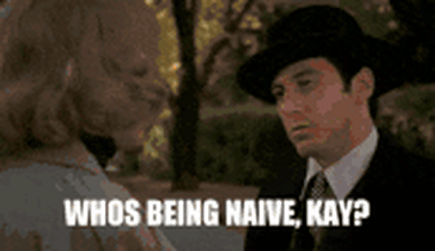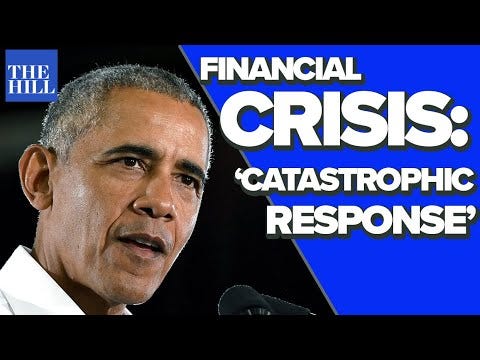What Is a Billionaire?
Hi,
Welcome to BIG, a newsletter about the politics of monopoly. If you’d like to sign up, you can do so here. Or just read on…
Lots of billionaire news flow this week. Bill Gates sort of criticized Elizabeth Warren’s wealth tax, and Warren unveiled a simple calculator to mock him. Bernie Sanders said more directly that billionaires shouldn’t exist. And Michael Bloomberg says he may jump into the Presidential race.
Ok. So here’s what most people think of when they think of a billionaire.

But a billionaire is not, as I’ll show, a cartoon duck with hoards of gold. Today I’m going to write about what a billionaire actually is. If you like it, there’s a lot more in Goliath: The Hundred Year War Between Monopoly Power and Democracy.
First, I did a bunch of media this week. My favorite was this morning, on Rising with Krystal Ball and Saagar Enjeti . Both hosts are super sharp. I love their show and we really got a chance to chat about the monopoly crisis, and why Obama’s Presidency failed.
And now…
A Billionaire Is Someone Who Runs a Very Important Tollbooth
Most people think a billionaire is someone with a lot of money, a sort of Scrooge McDuck who goes swimming in a pool of gold coins. And why wouldn’t we? The name billionaire has the word billion contained within it, so clearly it means having a net worth of at least ten figures. And in a sense, that is technically true. But if you look at the top ranks of the Bloomberg billionaire index, you’ll notice that nearly all of the leaders are people who own a corporation with substantial amounts of market power in one or more markets.

Billionaires use market power to extract revenue the way that a tollbooth operator does. If you want to drive on a road, you have to pay for the privilege. It costs the tollbooth operator nothing, he/she just has a strategic chokepoint for extraction. Billionaire Warren Buffett, for instance, has such a ‘tollbooth’ strategy for investing, though he uses the term ‘moat’ because it sounds charming and quirky rather than rapacious.
Put another way, the Bloomberg billionaire index isn’t a list of the most important Scrooge McDuck’s, it’s a list of the biggest tollbooth operators in the world.
So how do billionaires acquire such massive tollbooths? Surely it’s based on building better products and services, right?

Bill Gates Is a Billionaire Because of the Law
Bill Gates made his money the old-fashioned way. He stole it. Or well, most of it. As one person who made deals with Gates said anonymously: “A partnership with Microsoft is like a Nazi non-aggression pact. It just means you’re next.” It is perhaps not theft in the direct sense, in that he didn’t physically break into someone’s house and steal the contents of their safe, but he used anti-competitive tactics to extract property from other business people, tactics that in earlier generations would have brought assertive antitrust suits. The Sherman Antitrust Act, passed in 1890, is not just a civil statute, but a criminal one, and it can and has been used to send people to jail. Monopolization isn’t just a business practice, it is, according to the law, a crime.
Gates’s intellectual and business ancestor is John D. Rockefeller, who also made his money in a high-tech industry based on network economics and legal tricks to standardize on a platform. In fact, Rockefeller called his kerosene producing monopoly Standard Oil. It’s useful to go over Rockefeller’s tactics and philosophy, because it’s pretty much the same as Gates (and as Lina Khan shows, that of Jeff Bezos).
Starting out as an oil refiner in Cleveland, throughout the 1870s and 1880s Rockefeller began working with and buying out other refiners. Cleveland had many railroads connecting the oil fields of Pennsylvania and Ohio to his refineries. Rockefeller shipped so much oil that he could demand special pricing arrangements with those railroads. He asked railroads to give him a rebates on oil he shipped, a sort of bulk discount. He accumulated so much of the market that he also asked railroads to give him rebates on oil his competitors shipped. In other words, he taxed the entire industry, including his competition. He soon underpriced his competitors and was able to force them to sell out to him, bringing the whole industry under his control.
Rockefeller used the structure of networks, both railroads and pipelines, to seize control of the chokepoint in an industry. He wasn’t a wildcat oil driller, he simply forced those oil drillers to use his shipping and refining infrastructure, and could dictate prices. Standard Oil became a private governing force in the oil industry, and Rockefeller became a billionaire by the 1890s.
Standard Oil ran into legal trouble almost from inception. The corporation had been subjected to state lawsuits for decades, and in 1911, the Supreme Court ordered the dissolution into its component parts. The break-up itself was fascinating.
Politically the break-up, though humiliating, was a win in some ways for Rockefeller; Democrats were angry he got to keep his ill-gotten gains, and they put in their 1912 platform a note that Republicans were cowards for being unwilling to use the criminal part of the Sherman Act. The break-up also increased Rockefeller’s wealth tremendously. Standard Oil used good technology, but after several decades of market power, it had become slothful; only after the break-up in 1911 did one of the now-independent divisions of Standard Oil create the gasoline industry through new refining techniques. Rockefeller benefitted, as he still held his wealth in stock.
Like Gates, Rockefeller eventually became a philanthropist, pioneering the method of using large sums of money to engage in political control under the guise of charity. He financed research on prohibition, for instance, as well as a good amount of academia, and the creation of the University of Chicago. But his era ended, as populists and merchants put in place laws to erode such large swollen fortunes and the empires that created them. Antitrust and anti-merger laws, regulations on pipelines and railroads that prohibited discrimination, banking restrictions, unionization rules, the Federal income and corporate tax, the inheritance tax, and so forth, had their impact.
When Rockefeller died in 1937, popular commentator Walter Lippmann penned this famous argument about how political economy thinking had changed. “Before he started his enterprises,” Lippmann wrote, “it was not possible to make so much money; before he died, it had become the settled policy of this country that no man be permitted to make so much money. He lived long enough to see the methods by which such a fortune can be accumulated, outlawed by public opinion, forbidden by statute, and prevented by the tax laws.” This framework lasted until the late 1970s; it was inconceivable America would allow the re-emergence of robber barons like Rockefeller.
And yet we did. In fact, Bill Gates’s emergence as a massively powerful political and commercial actor bears an eery resemblance to that of Rockefeller. Gates too came into a new and fluid industry, not oil drilling, but personal computing, full of independent weird hobbyists experimenting not with new techniques around chemistry and extraction but communications, hardware, art and software. Like Rockefeller’s post-Civil War era, Gates in the early 1980s had a legal framework favorable to concentration.
In 1976 and 1980, Congress allowed the copyrighting of software. IBM had been under aggressive antitrust investigation and litigation since 1967, so when it built a personal computer, it outsourced the operating system - MS-DOS - to Gates’s company and allowed Gates to license it to other equipment makers. (Gates’s upbringing didn’t hurt; the CEO of IBM at the the time knew his mother.) Such a relationship with a vendor was a shocking change for IBM, which had traditionally made everything in-house or tightly controlled its suppliers. But IBM treated Microsoft differently, transferring large amounts of programming knowledge to the small corporation. IBM also did this with the microprocessor company Intel, which IBM protected from Japanese competition.
And yet, in 1982, the Department of Justice dropped the antitrust suit against IBM, signaling a new pro-concentration framework. Bill Baxter, Reagan’s antitrust chief, did not want to bring monopolization suits, and did not. The new fast-growing technology space of personal computers would be a monopolized industry. But it would not be monopolized by IBM, which had kept control of the computing industry since the 1950s, because IBM’s corporate structure was now skittish about the raw use of power. And it would not be monopolized by AT&T, which was kept out of the computing industry by a 1956 consent decree that lasted until 1984. Gates, in many ways, had a greenfield, an environment friendly to monopoly but one in which all the old monopolists had been cleared out by antitrust actions.
Gates didn’t at first think operating systems were that important, and he wanted to use the OS to sell programming languages. But soon he realized that the operating system was a key on-ramp to the personal computer, a tollbooth or chokepoint for all other software. And like Rockefeller with railroads/pipelines, Gates began using rebates to control this new network industry. He built a licensing regime that charged personal computer makers a fee for installing his operating system. More importantly, his licensing regime effectively required computer makers to pay a fee if they installed a rival operating system. Through a coercive partnership with computer makers, Gates imposed a tax on the entire industry, including his competitors, much as Rockefeller had using his relationship with railroads. The key tool for both was not technology, but pricing in the form of the rebate.
What Gates was doing was illegal, but not investigated until the 1990s. Eventually, in 1994, Anne Bingaman, Clinton’s antitrust chief, signed a consent decree demanding Gates stop its licensing regime, but by then it didn’t matter; the market had tipped so Microsoft’s operating systems were the standard. At that point, only public utility regulation would have been able to control Microsoft, but such proposals were considered insane in the libertarian 1990s. As the 1990s continued, Gates then used his control over the operating system to take control of most key applications on personal computers. Microsoft Word defeated Wordperfect and Excel defeated Lotus123. Microsoft also tried to buy Intuit, but was finally blocked by an aggressive judge, Stanley Sporkin, who had tired of the flabby DOJ’s approval of mergers.
By the late 1990s, Microsoft executives were talking about getting a ‘vig,’ which is a mobster term for a piece of the action, out of every transaction that happened on the new space called the internet. Microsoft began putting lots of money into new ventures to take over entire swaths of the real economy, many of which didn’t work or were out of place for a software company (there’s a reason it’s called MSNBC). The last straw was when Microsoft essentially sat down a group of venture capitalists and told them where they could invest, and where Microsoft was investing. When the corporation sought to kill Netscape, which was the on-ramp to the internet, it was obvious that Gates wanted to control the internet. He couldn’t, and didn’t, because of a major antitrust suit launched in 1998 by the Federal government. He had sought to become Facebook, Google, and Amazon, and would have been able to if antitrust enforcers hadn’t stepped in.
Gates is a very good business man and would have been wealthy regardless. But there’s a difference between having $100 million and $100 billion. He has massive amounts of power because he captured control of a very important tollbooth in the economy at a very early stage in its creation. We call him a billionaire because when you measure what this power is worth, it comes to $100 billion or so (plus whatever he’s put in the Gates Foundation). But the dollar figure is just the accounting system. There’s no swimming pool of gold coins, there is a tollbooth called Microsoft Windows.
And that is true for most billionaires. They are not people with a bunch of dollar bills stacked to the moon, they are (largely) men with a strategic position of power protected by public laws and rules. They aren’t better or smarter than anyone else, they are simply politically adept and in the right place at the right time. There’s no reason we have to enable such people to run our culture. At the end of the day, tollbooths are nothing but bottlenecks on a road on which we would otherwise travel faster and more freely.
Thanks for reading. And if you liked this essay, you can sign up here for more issues of BIG, a newsletter on how to restore fair commerce, innovation and democracy. If you want to really understand the secret history of monopoly power, buy my book, Goliath: The 100-Year War Between Monopoly Power and Democracy.
cheers,
Matt Stoller

